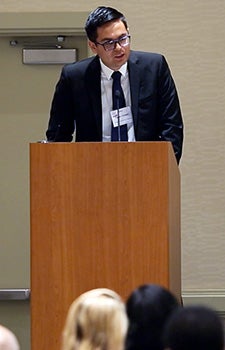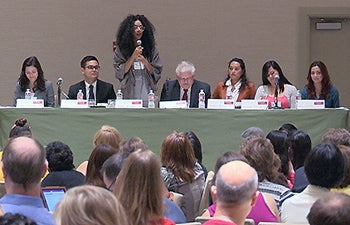The Importance of Mentorship
Adrian Trinidad was in third grade at an inner city Los Angeles elementary school when a chance encounter during a school trip to USC changed the course of his life. A student gave the young boy a bookmark for the Norman Topping Student Aid Fund — a gift Trinidad, now a senior majoring in sociology and minoring in forensics and criminality at USC Dornsife, still cherishes to this day.
“School was not a priority, instead it was getting home safe and having food on the table,” Trinidad said of his childhood growing up in South L.A. He cared for a father with a debilitating illness, while his mother worked 12-15 hours a day. When applying to universities, USC was the only one on his list.
Trinidad met George Sanchez, vice dean for diversity and strategic initiatives at USC Dornsife, at a Topping Scholarship retreat during his sophomore year. At the urging of another Topping Scholar, he introduced himself and Sanchez immediately took him under his wing.
Trinidad was one of six former and current first-generation college students from USC who earned a standing ovation when they spoke alongside Sanchez, their mentor, at the annual Association of American Colleges and Universities conference on March 27. More than 700 educators attended the group’s plenary session on “Student Voice, Student Empowerment, Student Agency” at the Westin Hotel in San Diego, California.
Undergraduates MJ Plascencia and Felicia Reyes plus alumni Eunice Velarde, Jasmine Torres and Debbie Rumbo joined Trinidad in sharing their experiences. Their primary message? Mentorship is the key component to success.

Adrian Trinidad, a senior majoring in sociology and minoring in forensics and criminality talks about mentorship at the annual Association of American Colleges and Universities conference. Photos by Mira Zimet.
“Dr. Sanchez’s mentorship has made me take advantage of the resources available at my university and has added tremendous value to my undergraduate education,” Trinidad said. “He gave me the courage to take ownership of my education and not set limitations because of my background. I now feel that anything is possible, regardless of where you come from or what your interests are — you just need to have the right mentor and support to get there.”
Velarde talked about how she was the second in her family to graduate high school and the first from college. Arriving as a transfer student at USC, she was unprepared. “No matter how hard I tried,” she said, “I could not keep up with everyone’s pace. I felt very lonely and different. As a result, my education suffered. I felt the odds were stacked against me and I came very close to giving up.”
Then Velarde met Sanchez who introduced her to USC Dornsife’s Summer Undergraduate Research Fund, which provides students with stipends to conduct research over the summer. After earning her bachelor’s in American studies and ethnicity in 2010, Velarde now works at the Keck School of Medicine of USC.
“I used to be afraid to ask questions,” she said, “but now I am fully engaged in the business of seeking answers.”
Like his mentees, Sanchez was also a first-generation college student.
“To be the first in your family to attend college certainly makes you a pioneer, but often leaves you feeling alone and confused,” said Sanchez. “Often you may feel the pull back to routes of survival that are more comfortable and well-worn.”

Led by Dr. George Sanchez, six current and former USC Dornsife students gave a presentation on mentorship at the conference.
Describing the numerous mentors who guided him along his educational journey, Sanchez spoke about how mentorship can be best supported within an academic environment. At USC Dornsife, he strives to empower students from all backgrounds to take full advantage of everything the university has to offer.
“To compete successfully in the university environment, it’s important that we understand and serve the needs of individual students, with all the complexities and differences they bring to the campus,” said Sanchez, professor of American studies and ethnicity, and history. “It is important to me that as educators, we mentor students from the heart and the mind, pushing them to creatively find their own paths and use their enormous potential to discover what contributions they want to make to this world we inhabit together.”
Sanchez noted that for an academic mentorship program to be successful it must build in substantial structured and unstructured time for faculty members to really talk with students, outside of the classroom and during office hours. He also pointed out that mentorship must go beyond any one program, course or semester. Citing a 2013 Purdue-Gallup Study of 38,000 college graduates, he noted that the survey identified two issues that mark successful undergraduate careers: a real relationship with a mentor and a project of one’s own that stretches beyond one semester. “Only five percent of college graduates believe they have had both,” Sanchez said.
“Allowing students to dream big dreams and imagine themselves in their own futures, helping them connect with the resources they need to succeed and enabling them to have the experiences that can propel their learning forward — all of this is what effective mentorship and creative programming for student success must do. It takes time and it takes effort, but it is worth it when one witnesses what can be achieved.”